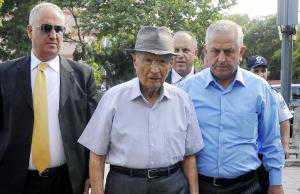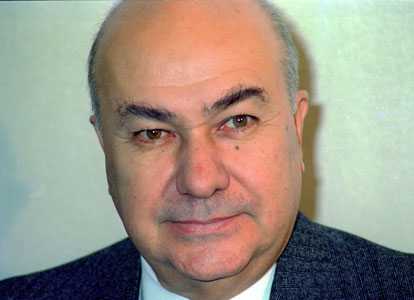Two Leaders of Turkey’s 1980 Coup Indicted
Dorian Jones | Istanbul

Photo: AP
Kenan Evren, the leader of Sept. 12, 1980 military coup, arrives to cast his vote in a referendum in Ankara, Turkey. (File Photo – September 12, 2010)
In Turkey, the two surviving leaders of a 1980 military coup have been charged with crimes against the state. The move is seen by many as an important step in the country facing up to its dark past of military rule.
The leader of the 1980 Turkish coup, retired general Kenan Evren, and a co-conspirator, former air force chief Tahsin Sahinkaya, have been indicted by an Ankara court on crimes against the state.
Reaction
In Taksim Square in the center of Istanbul, the scene of a massacre preceding the coup, there is mixed reaction from people to the indictments.
“He had made a coup, and lots of people had been tortured,” said a passerby. “He killed lots of people. That is why have to prosecute him.”
“No, no, I do not agree,” he added. “I believe in him because I lived those times, and I know what happened. Government should send him to court because he destroyed democracy. Still people hate him. For example, my father was tortured by the soldiers.”
The generals seized power in 1980 after years of political unrest, which claimed hundreds of lives. Prosecutors claim much of that unrest was incited by the army.
Aftermath of coup
The years of military rule that followed saw 50 people executed and hundreds of thousands more detained, many of whom were tortured. One of them was Defne Sandalye.
“I was arrested twice after the coup d’etat,” said Sandalye. “I spent most of my time at the interrogation center, which was the torture center. First time, I was there for a month, and then I was released, and then five months later, I was arrested again. Then I spent three-and-half months in the torture center.”
The indictment of the two surviving coup leaders comes as Turkey is finally facing up to its dark years of military rule.
“It is important to do this because Turkish people are suffering from an historical amnesia, and they not very apt to facing their past,” added Sandalye. “Also people easily surrender to authority here. For long years, no one questioned, nobody questioned what the army is capable of and what it has been doing.”
AK Party and army
Throughout its decade rule, the Islamic-based AK Party has sought to bring the secularist army to heel. In 2010, constitutional reforms were passed in a referendum that lifted the immunity of the coup leaders.
But the timing of the indictments against the coup leaders has raised some questions.
“They should be prosecuted because they committed a crime, which cannot be legitimized nor justified,” said political columnist Kadri Gurcel of the Turkish newspaper Milliyet. “But I see this one as a purely tactical step to divert the discussion, which will also change the agenda.”
The government is facing growing domestic and international criticism for its human-rights record. The European Union has been highly critical of Turkey’s human rights and its judiciary. Ending the army’s role in politics is one of the government’s main human-rights goals as Turkey tries to gain EU membership.
A significant step
Political scientist Cengiz Aktar of Bahcesehir University says whatever the motivations behind the prosecution of the coup leaders, it remains a significant step for Turkish democracy.
“It is symbolic,” said Aktar. “It is very important. That man [Evren] organized and chaired the junta. And he was having a beautiful life in the Turkish Riviera until now. I think it is high time for him to pay for his crimes. Because the 1980 coup did a great deal of damage to democratic life in this country, and we are still living with the consequences of this 1980 coup.”
The prosecutors have sought life imprisonment for the coup leaders – Kenan Evren, who is 94 years old, and Tahsin Sahinkaya, who is 86. For the victims of military rule, there is hope that those responsible will be held to account in court, something observers say was unthinkable only a few years ago.
via Two Leaders of Turkey’s 1980 Coup Indicted | Europe | English.




 WMR has discovered a
WMR has discovered a